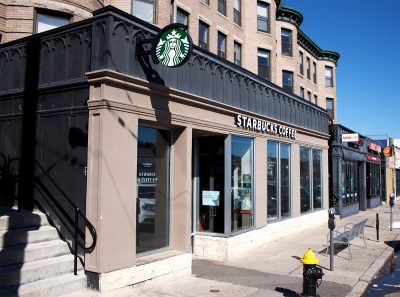
Two Starbucks locations, one in Allston and the other in Coolidge Corner, have moved to unionize, making it a total of four in the city that have joined nationwide efforts to organize.
Ash O’Neill, a barista at Starbucks in Allston and a senior at Lesley University, said the effort to unionize comes after the company made a number of COVID-19 policy decisions without workers being consulted first.
“Our main reason for pushing to unionize is really making sure that we get more of a say in what happens at our workplaces in our individual stores,” O’Neill said.
O’Neill said the unionization of Pavement Coffeehouse last year inspired them to push for the same benefits.
Employees of the two Starbucks branches joined other labor activists and unions in a march Feb. 26 at Government Center. The march highlighted the efforts of union-building and the fight against racism, according to a statement.
“We want to incorporate the battle for equity, political and social justice,” said Jamie Wallace, a union glazier and president of Coalition of Black Trade Unionists-Boston.
Kylah Clay, who is also a barista at Starbucks in Allston and a master’s student at Boston University Metropolitan College, said it’s important for workers to support each other in their efforts to unionize.
“There’s a saying in the labor movement, that when there’s an injury to one, there’s an injury to all,” Clay said. “We’re all a part of this struggle together.”
Clay said she expects the Starbucks in Allston to model its union requests after Starbucks in Buffalo, New York.
Starbucks workers in Buffalo voted 19-8 to form a union on Dec. 9, 2021, becoming the first Starbucks coffee shop in the country to unionize.
Progressive Massachusetts, a grassroots social justice organization, endorsed efforts to unionize.
“Starbucks has gained a reputation as a socially responsible company, and we ask management to live up to their professed ethos and treat workers asking for a union with respect and dignity, not coercion and retaliation,” the organization wrote in a Feb. 17 statement.
Steve Gillis, a Boston school bus driver and executive board member of the United Steelworkers Local 8751, said that the unionization has come at the right time.
“It’s been in that climate of the global Black Lives Matter movement, the movement for Indigenous rights, for LGBTQ rights, that has been uplifted, especially in the last couple of years, that this union organizing phenomenon has taken place,” Gillis said.
Gillis said the main reason people unionize is for higher pay, but unions can also help society run smoother.
“To have a unionized workforce that’s getting more respect and pay benefits and rates, this is what makes various systems, from schools to warehouses, run better,” Gillis said. “The opposite is true in their absence.”
According to Wallace, those who want to unionize comprise those who also face systemic racism.
“Those are marginalized people,” Wallace said. “Those are the ones that are getting the short end of the stick all the time. So we have to form these coalitions to fight this monster.”
On Dec. 13, two Starbucks, also in Allston and Coolidge Corner, moved to unionize following the landmark Buffalo case, making it four coffeeshops in total in the city looking to organize.
Clay said she continues to help other baristas in the local area to unionize and encourages young people to show support.
“We now have nine stores in the Massachusetts area that have filed a petition, and we’re helping more every day,” Clay said. “So if there are any students who are working at Starbucks and want to unionize, they can reach out… to show support.”














